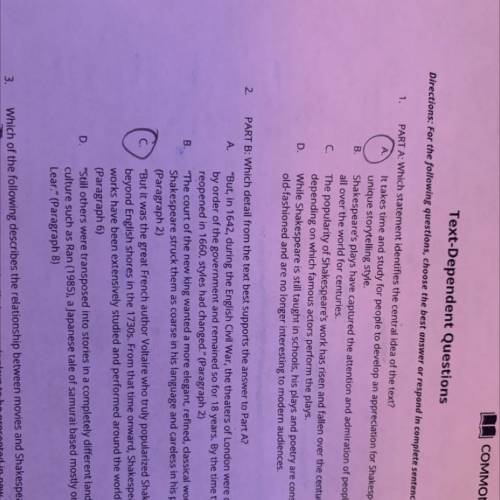2.
PART B: Which detail from the text best supports the answer to Part A?
A. "But, in 1642, d...

English, 12.04.2021 23:50 morgans53005
2.
PART B: Which detail from the text best supports the answer to Part A?
A. "But, in 1642, during the English Civil War, the theaters of London were closed
by order of the government and remained so for 18 years. By the time they
reopened in 1660, styles had changed." (Paragraph 2)
B. "The court of the new king wanted a more elegant, refined, classical world, and
Shakespeare struck them as coarse in his language and careless in his plots."
(Paragraph 2)
"But it was the great French author Voltaire who truly popularized Shakespeare
beyond English shores in the 1730s. From that time onward, Shakespeare's
works have been extensively studied and performed around the world."
(Paragraph 6)
D. "Still others were transposed into stories in a completely different land and
culture such as Ran (1985), a Japanese tale of samurai based mostly on King
Lear." (Paragraph 8)


Answers: 3


Another question on English


English, 22.06.2019 05:00
Read the excerpt from frederick douglass’s speech “what to the slave is the fourth of july? ”go where you may, search where you will, roam through all the monarchies and despotisms of the old world, travel through south america, search out every abuse, and when you have found the last, lay your facts by the side of the everyday practices of this nation, and you will say with me, that, for revolting barbarity and shameless hypocrisy, america reigns without a rival.what is one way that douglass achieves his purpose of persuading the reader to see his point of view? by relating as many facts and statistics to the reader as possibleby using familiar and casual language to make the reader feel comfortableby using gentle language to evoke a sense of calm and tranquilityby repeating the word “you” to directly relate to the reader
Answers: 1

English, 22.06.2019 06:40
Activity construct an argument about a topic, theme, or idea that you read about in william shakespeare's romeo and juliet, act ii or act iii. make sure you create a central claim for your argument that is debatable. provide textual evidence from the play to support your argument. here are some ideas for your essay. notice how each topic is focused and specific. you may write about one of these topics or choose your own focused and specific topic: discuss juliet's level of maturity and compare it to romeo's. compare how the two characters react to the events after their marriage, when romeo is banished from verona. discuss the balcony scene. does the knowledge of romeo and juliet's final fate influence the meaning of the balcony scene or the audience's interpretation of it? discuss the characters of tybalt and romeo as they relate to the theme of family and the theme of love. explain how the character of tybalt develops the theme of family and how the character of romeo develops the theme of romantic love. discuss the character of friar laurence. what motivates him to romeo and juliet to defy their parents? part a choose a topic based on what you read in act ii or act iii of romeo and juliet. then write a thesis statement. part b identify two or three short excerpts from the play as textual evidence to support your thesis statement. part c write a 300-word essay arguing the thesis of your analysis. (i mainly need on part b and c)
Answers: 1

English, 22.06.2019 08:30
Which detail from chancer's "the monk's tale" best demonstrates that fortune is a "blind property" that no one should trust? a.julius ceaser rose up because of wisdom, bravery, and intelligence b. king belshazzar became the ruler after his powerful father became king c.samsons enemies blinded him but he was able to destroy them before he died d.queen zenobia enjoyed vast power but her enemies conquered her in the end
Answers: 1
You know the right answer?
Questions

Mathematics, 04.12.2019 07:31

Biology, 04.12.2019 07:31


Mathematics, 04.12.2019 07:31




Mathematics, 04.12.2019 07:31





Biology, 04.12.2019 07:31

Mathematics, 04.12.2019 07:31

Mathematics, 04.12.2019 07:31


Mathematics, 04.12.2019 07:31


History, 04.12.2019 07:31



